On a site like this one, we review a lot of different VPN providers. And one thing I’ve come away with is that, on the surface, they seem very similar to one another.
And it can be difficult to see what sets a VPN provider apart from the others.
So with that in mind, in this post, we compare PureVPN and ExpressVPN to see how they differ and make a recommendation.
PureVPN vs ExpressVPN - Side By Side
| Name | ExpressVPN | PureVPN |
|---|---|---|
| Rating | 9.0/10 | 6.5/10 |
| User Friendliness Score | 9 | 7 |
| General features | ||
| Price per month (cheapest) | $8.32 | $3.33 |
| Simultaneous Connections | 5 | 10 |
| Servers | 3000 | 2000 |
| Countries | 94 | 140 |
| Allows torrenting / P2P | Yes | Yes |
| Streaming | ||
| Netflix | Yes | Yes |
| Hulu | Yes | Yes |
| Amazon Prime | Yes | Yes |
| Disney+ | Yes | Yes |
| Security | ||
| Supports TOR | No | No |
| Split Tunneling | Yes | Yes |
| Router Support | Yes | Yes |
| Unlimited bandwidth | Yes | Yes |
| Refund Period | 30 Days | 31 Days |
| Free trial | No | No |
| Desktop Operating Software | Windows, MacOS, Linux | Windows, MacOS, Linux |
| Mobile Apps | iOS, Android | iOS, Android |
| Browser Extensions | Yes | Yes |
| VPN Protocols | IKEv2, OpenVPN, L2TP/IPSec, PPTP | IKEv2, OpenVPN, WireGuard, L2TP/IPSec, PPTP |
| Encryption | AES-256 | AES-256 |
| DNS Leak Protection | Yes | Yes |
| VPN Kill-switch | Yes | Yes |
| Rent/Own Infrastructure | Rent | Own |
| Hacked | No | No |
| Malware/Ad Blocker | No | No |
| Privacy | ||
| Logging Policy | No-logging Policy | No-logging Policy |
| Privacy Policy | Good | Good, but we don't fully trust they conform to their policies. |
| Jurisdiction | British Virgin Islands | Hong Kong |
| Out of 14 eyes | Yes | Yes |
| Warrant Canary | No | No |
| Accepts Cryptocurrency | Yes | No |
| Sign-up Information Required | Only Valid Email | Valid Email and name |
| Speed (average) | ||
| Avg. Ping NY | 23 ms | 162.33 ms |
| Avg. Download NY | Over a 60 Mbps Network (Download): 60.76 Mbps | Over a 100 Mbps Network (Download): 75.22 Mbps |
| Avg. Upload NY | Over a 30 Mbps Network (Upload): 26.91 Mbps | Over a 30 Mbps Network (Upload): 28.25 Mbps |
Can't choose between PureVPN or ExpressVPN?
PureVPN and ExpressVPN are both well-known players in the commercial VPN space. Though ExpressVPN is a bigger player than PureVPN.
On the surface, they both commit to a no-logging policy. They’ve also both been independently audited - successfully.
On the infrastructure side, both these providers also impress.
ExpressVPN (British Virgin Islands) provides a diskless infrastructure, meaning that everything rune in volatile memory (RAM) - which affords extra security.
And for PureVPN (Hong Kong), they actually own their massive network of 2000+ servers. I know of no other VPN providers that own such a large network.
However, as reported by The Register and PCMag, in 2017, PureVPN spied on its users and handed that information to law enforcement - in direct contradiction with their privacy policy.
ExpressVPN doesn’t have such a stain in its history.
So this will likely not be a close one.
1. Speed
Speed is always going to be at the top of the list of concerns for anyone one the Internet.
And a VPN will always add some latency to your connection, so a slowdown is to be expected. And of course, the smaller the slowdown, the better.
Let’s take a look at how PureVPN and ExpressVPN compare on speed.
PureVPN
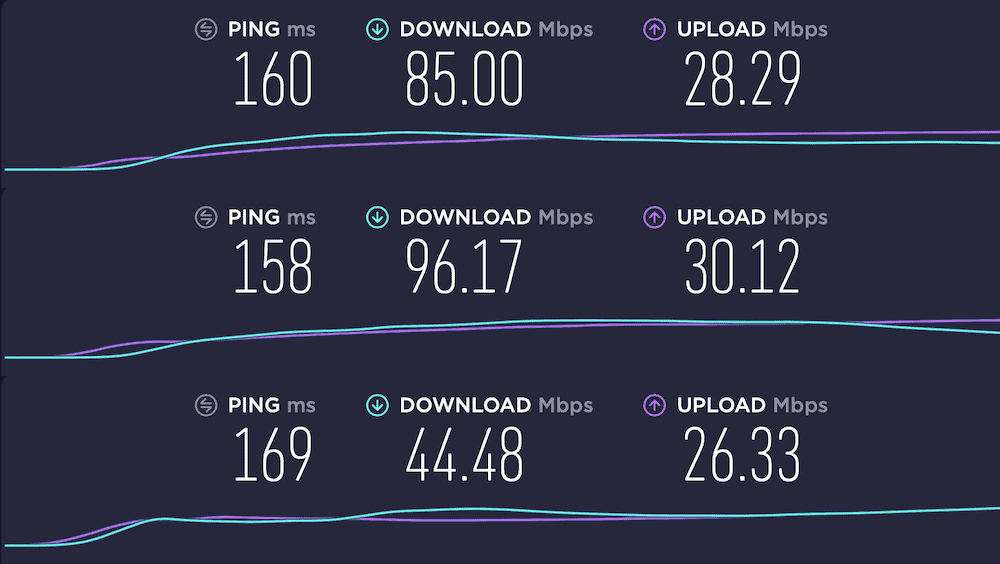
Tested on a 100Mbps (Download) and 30Mbps (Upload) network
Server: U.S.A., New York
Average Download Speed: 75.22Mbps
Average Upload Speed: 28.25Mbps
ExpressVPN
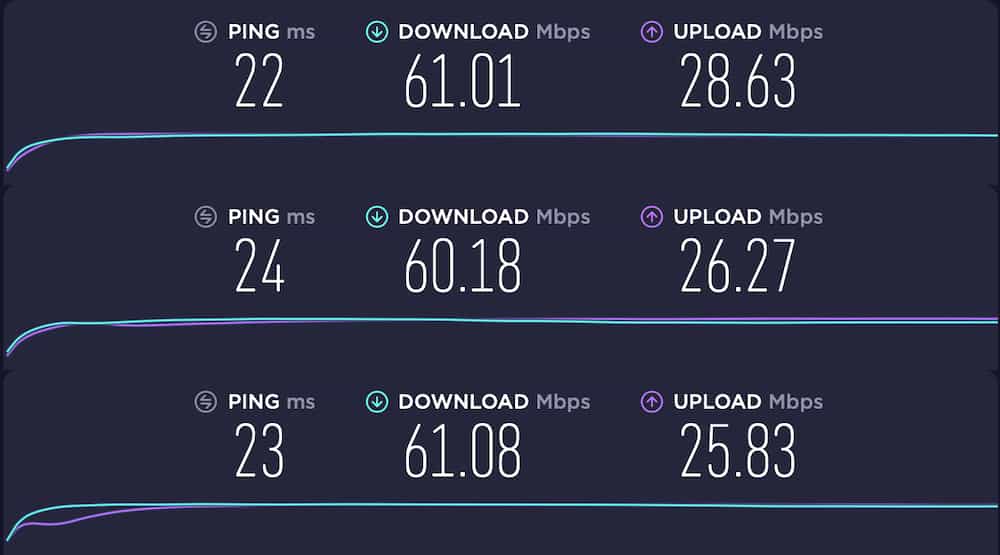
Tested on a 60Mbps (Download) and 30Mbps (Upload) network
Server: U.S.A., New York
Average Download Speed: 60.76Mbps
Average Upload Speed: 26.91Mbps
So what we want to look at is the difference between the ISP official speed and the speed test results.
And we can see that on download, ExpressVPN does better, insofar as there is no slowdown whatsoever. And we have good speeds here.
Of course, the speeds could change if I kept repeating the test. But this shows us that ExpressVPN’s network can handle all of my available bandwidth. Very good.
With PureVPN, we’re losing about a quarter of our bandwidth. It’s not the worst I’ve seen, but it’s far from the best.
Winner: ExpressVPN
The point goes to ExpressVPN. The speed impact is seamless over ExpressVPN. While they fare essentially the same as far as upload goes.
2. User-Friendliness
VPNs used to be an obscure tool used by techies, but those days are over. There are more people using VPNs today than ever before.
And that means user-friendliness is now a critical feature for VPN providers, as more and more non-techies get on the VPN train.
Both PureVPN and ExpressVPN provide native client apps for a large number of platforms and they both supply Chrome and Firefox browser extensions.
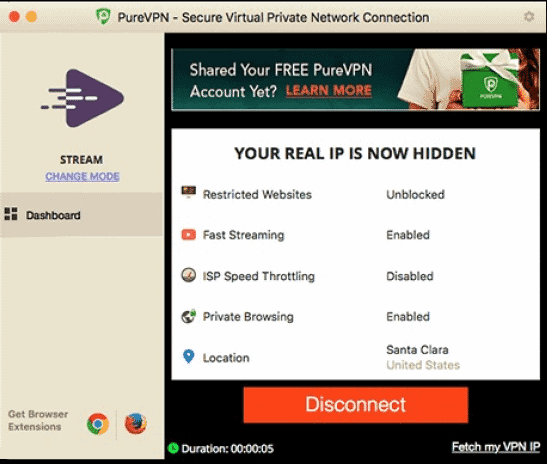
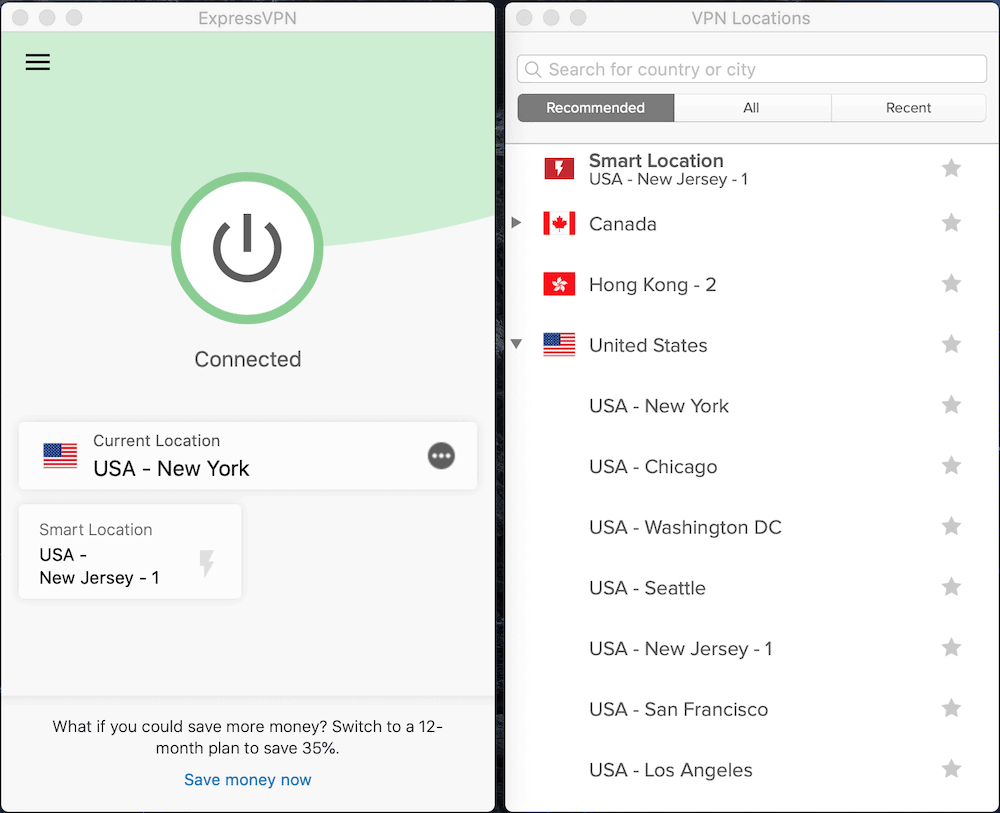
ExpressVPN allows up to 6 simultaneous connections. And PureVPN allows up to 10 (recently up from 5).
However, PureVPN’s app has a few things we don’t like:
- It displays hallow security marketing lingo
- It displays ads for PureVPN
- It is filled with third-party trackers
You read that correctly. PureVPN, supposedly a privacy company, is using third-party trackers in their apps.
ExpressVPN has none of these failings and provides a well-designed, easy to use client app.
Winner: ExpressVPN
ExpressVPN has better apps that won’t track you. There are no two ways about it. ExpressVPN takes the point here as well.
3. Streaming
Streaming over a VPN has many advantages beyond a more secure experience. It allows you to bypass geo-restrictions and circumvent ISP throttling.
But as time went by, certain streaming services wanted to close the “VPN loophole”. And so some services, such as Netflix, started banning VPNs from their service.
And naturally, unblocking Netflix instantly became a critical feature for VPN providers to offer.
Both providers here identify as streaming-friendly services. And both providers claim they can unblock Netflix.
And both ExpressVPN and PureVPN provide a dedicated webpage, on their respective sites, with instructions on how to unblock Netflix.
And as I wrote in my Netflix reviews of ExpressVPN and PureVPN, they both effectively unblock the streaming service easily and without freeze-ups, lag, or buffering.
Winner: Tie
It’s a tie here. Both providers unblock Netflix and provide an optimal experience.
4. Security & Encryption
Let’s look at the VPN protocols that each provider supports.
ExpressVPN supports:
- IKEv2/IPSec
- OpenVPN
- L2TP/IPSec
- PPTP
PureVPN supports:
- PPTP
- IPSec
- L2TP/IPSec
- IKEv2/IPSec
- OpenVPN
- SSTP
Both ExpressVPN and PureVPN support the industry-standard cipher: AES-256. This cipher has no known vulnerabilities and is considered very secure.
However, on the protocol side, they both also support weak and obsolete protocols, like L2TP/IPSec and PPTP.
I’ve said it before and I’ll say it again. Weak protocols should be phased out and support for them should be dropped. Supporting weak protocols puts less technical users at risk.
Winner: Tie
We’re granting a tie here. They both have the same strengths and the same flaws here.
5. Logs & Privacy
Both providers put forth strong no-logging policies. Let’s take a look at how well they communicate this in their respective privacy policies.
Here’s an excerpt of ExpressVPN’s privacy policy:
"ExpressVPN is committed to protecting your privacy. We want you to understand what information we collect, what we don’t collect, and how we collect, use, and store information. We do not collect logs of your activity, including no logging of browsing history, traffic destination, data content, or DNS queries. We also never store connection logs, meaning no logs of your IP address, your outgoing VPN IP address, connection timestamp, or session duration”.
It is clear, contains no Legalese, and can be understood by non-techies.
Her’s an excerpt of PureVPN’s privacy policy:
"We DO NOT keep any record of your browsing activities, connection logs, records of the VPN IPs assigned to you, your original IPs, your connection time, the history of your browsing, the sites you visited, your outgoing traffic, the content or data you accessed, or the DNS queries generated by you”.
This is also not a bad privacy policy. And it is clear and accessible.
But, again, PureVPN has a trust deficit, because they have previously spied on its users. So while they can produce a stellar privacy policy, the question remains as to whether we can trust them or not…
Winner: ExpressVPN
The point goes to ExpressVPN here. I believe the kind of breach of trust committed by PureVPN should not be recoverable. Not in this industry, anyway.
6. Pricing
Let’s turn to pricing now. Below, I’ve listed the different packages, prices, and accepted payment methods for PureVPN and ExpressVPN:
PureVPN
Visit PureVPN (7 day trial)
PureVPN offers four different subscriptions:
- 0.99 USD – 7-Day
- 10.95 USD – 1 Month
- 49.98 USD – 6 Months (8.33 USD per month)
- 77.88 USD – 1 Year (6.49 USD per month)
Payment Methods
- Credit card
- PayPal
However, the yearly plan is not advertised on their website. The 7-day trial is converted into a yearly plan unless it’s canceled before it expires.
ExpressVPN
Visit ExpressVPN (save 35%)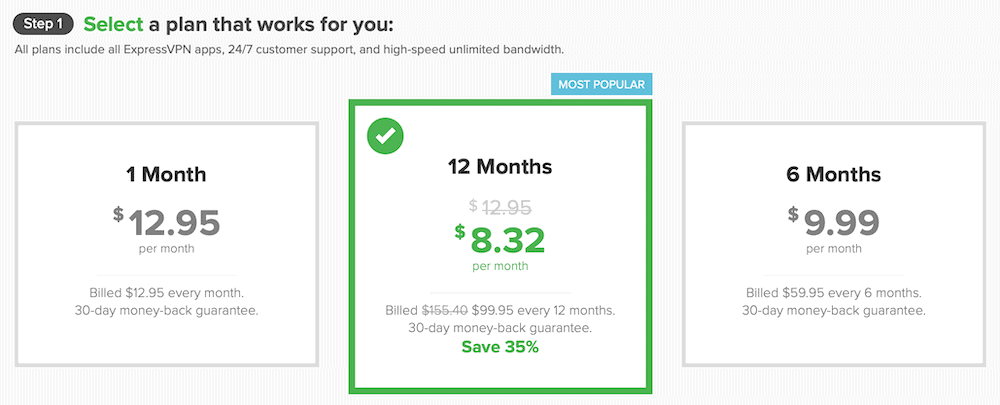
ExpressVPN offer three subscription terms:
- 12.95 USD for one month of service
- 59.95 USD for six months of service (works out to 9.99 USD per month)
- 99.95 USD for one year of service (works out to 8.32 USD per month)
Payment Methods
- Credit card
- PayPal
- Bitcoin
- UnionPay
- AliPay
- Interac
So PureVPN is less expensive than ExpressVPN across the board. However, ExpressVPN supports many more payment methods and, crucially, accepts Bitcoin, making anonymous payments possible.
Winner: PureVPN
It could have gone either way for me, because of the critical importance I place on accepting cash or cryptocurrency. But I will give the point to PureVPN because they are significantly cheaper than ExpressVPN and this is the “Pricing” category, after all. However, I would still choose ExpressVPN over PureVPN, even if it means having less cash left in my pockets.
7. Torrenting
Both providers are P2P-friendly. PureVPN provides dedicated P2P servers while ExpressVPN supports P2P on all of their servers.
I tested them both and I was downloading within seconds, on both networks. And both networks provided fast downloads, without lag.
Both providers performed equally well.
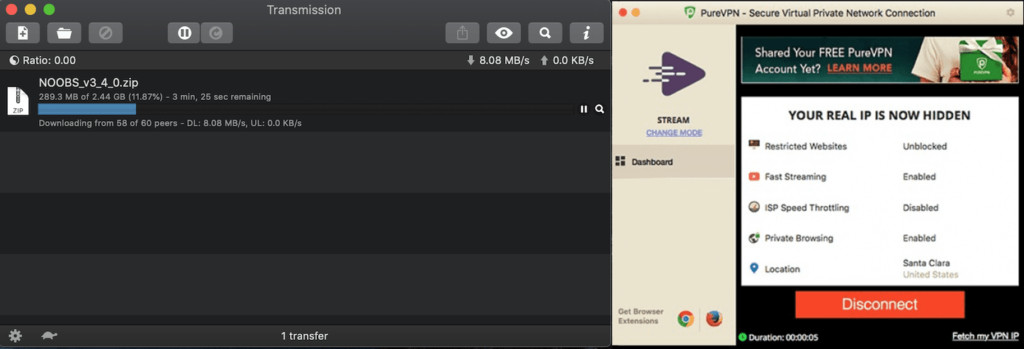
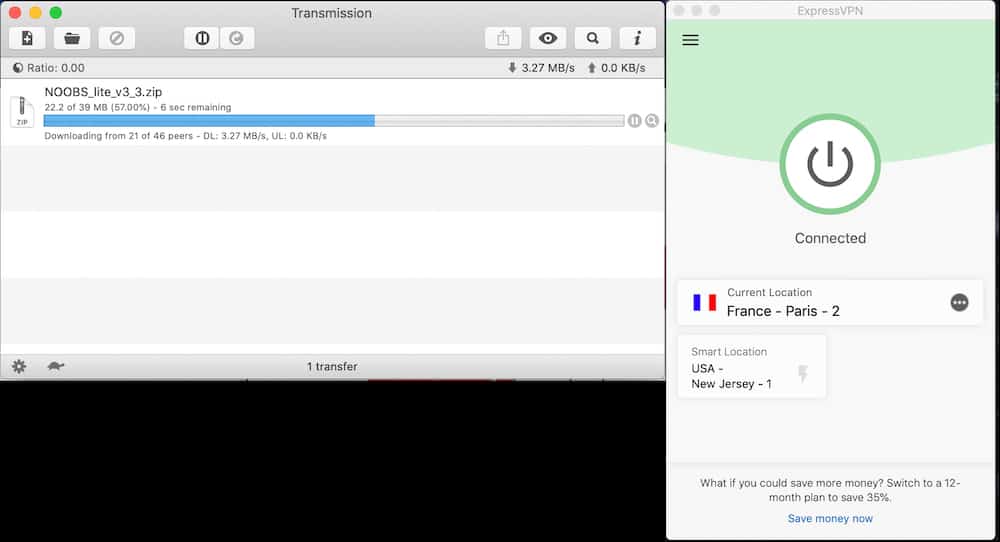
Winner: Tie
Another tie here. Impossible to set them apart from each other in the “Torrenting” category.
8. Other Features
So the “Other Features” section is going to be a little bit anemic here. Not because these two VPN providers don’t support enough features. But because their feature sets are very similar.
But we did manage to dig up one such feature for each provider.
ExpressVPN uses diskless servers across their entire infrastructure
PureVPN owns its entire infrastructure
Outstanding Features
ExpressVPN
- Diskless Servers: ExpressVPN set up all of their VPN servers to run from volatile memory (RAM). Hence the expression “diskless servers”. The servers run off the RAM, which means that in the event of a breach, the server can simply be rebooted and it’s back to “factory settings”. This is very secure and is likely one of the reasons ExpressVPN has never been hacked.
PureVPN
- Full Infrastructure Ownership: PureVPN hosts over 200 servers. And they own and control them all. This is pretty impressive. I’ve never seen a VPN provider with such a large number of servers own its entire infrastructure. But while this is a great feature, the company hosting the servers still needs to be trustworthy. And as far as PureVPN is concerned, that’s far from clear… Still an impressive feat.
Winner: ExpressVPN
While owning your entire infrastructure is great from a security perspective, so is running all of your servers from RAM. And ExpressVPN doesn’t have a trust deficit. And that’s enough to give ExpressVPN the point, in my book.
Conclusion: PureVPN vs ExpressVPN
And the winner is…
So we had eight categories in this ExpressVPN vs PureVPN comparison. And in each category, the winner gets one point. And in the event of a tie, both providers get a point.
And it looks like this:
- Speed – (ExpressVPN)
- User-Friendliness – (ExpressVPN)
- Streaming – (Tie)
- Security & Encryption – (Tie)
- Logs and Privacy – (ExpressVPN)
- Pricing – (PureVPN)
- Torrenting – (Tie)
- Other Features – (ExpressVPN)
So that’s 7 points for ExpressVPN and 4 points for PureVPN.
It’s not a close one. But it’s actually closer than I would have thought. It nonetheless remains that ExpressVPN is the better provider. And all PureVPN has over ExpressVPN is better prices.
But I’d recommend parting with a few more dollars/euros and signing-up to a VPN you can trust.
ExpressVPN is recommended over PureVPN.
PureVPN
Go With PureVPN if:
- You’re not all that concerned with security & privacy.
- You don’t want to pay too much for a VPN.
- You simply want a VPN to unblock Netflix.
ExpressVPN
Go With ExpressVPN if:
- Security and privacy are at the top of your list of reasons to use a VPN.
- You like the security benefits of diskless servers.
- You want a VPN provider that won’t spy on you.
For more information on these two VPN providers, check out our ExpressVPN review and our PureVPN review.
VPN > VPN Comparisons > VPN Services
PureVPN Vs. ExpressVPN - Head to Head
By Marc Dahan
Last updated: August 15, 2020




